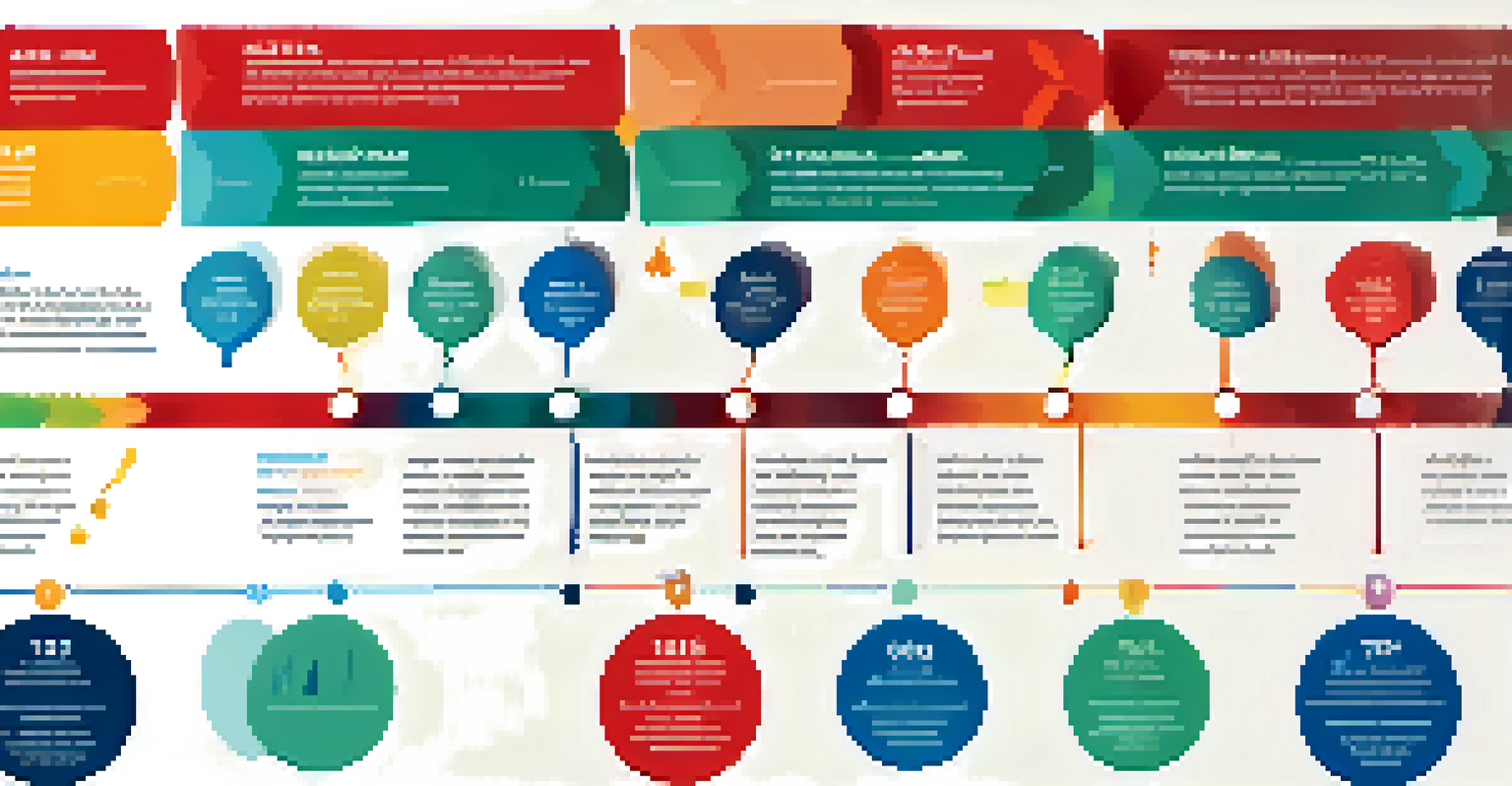How to Choose the Right Screenings Based on Your Age

Understanding Health Screenings and Their Importance
Health screenings are proactive measures designed to detect potential health issues before they become serious. They can range from blood pressure checks to more specialized tests like mammograms or colonoscopies. Understanding their importance is crucial, as early detection often leads to better health outcomes.
An ounce of prevention is worth a pound of cure.
Screenings are tailored to different age groups because our bodies change as we grow older. What might be a relevant test for a young adult could be unnecessary for someone in their sixties. By aligning screenings with age-specific health risks, we can make better health choices.
Ultimately, knowing which screenings are right for you can empower you to take charge of your health. It’s like having a roadmap for your wellness journey, ensuring you’re prepared for the bumps along the way.
Screenings for Young Adults (Ages 18-29)
For young adults, the focus is often on preventive care and establishing a health baseline. Common screenings include cholesterol checks, blood pressure readings, and discussions about mental health. These screenings can help identify issues early and promote healthy habits.

Additionally, vaccinations are a key part of this age group’s health screenings. Ensuring you’re up-to-date on vaccines like HPV and meningococcal can protect against severe illnesses. It’s essential to prioritize these preventive measures to maintain your overall well-being.
Importance of Regular Health Screenings
Health screenings help detect potential issues early, leading to better treatment outcomes and overall well-being.
Lastly, this age range is perfect for discussing lifestyle choices, as they can have a long-term impact on health. Engaging in conversations about diet, exercise, and mental health can set the foundation for a healthier future.
Essential Screenings for Adults (Ages 30-39)
As you enter your thirties, the body starts to display different health signals. Screenings for cholesterol levels and blood sugar become more important, especially if there’s a family history of conditions like diabetes. Regular check-ups help establish a clearer picture of your health.
The greatest wealth is health.
Women should begin discussing gynecological screenings, such as Pap smears and breast exams, while men should consider prostate health discussions. These screenings can help catch issues early when they are most treatable. Prioritizing these conversations with your healthcare provider is essential.
Also, mental health screenings gain more importance during these years as life can become more stressful with career and family responsibilities. Regular check-ins can help maintain mental well-being, ensuring you’re not just physically healthy but emotionally supported too.
Health Screenings for Middle-Aged Adults (Ages 40-49)
Entering your forties brings about a shift in health priorities, as the risk for various conditions increases. Screenings for high blood pressure, cholesterol, and diabetes become essential. It's a time to be more vigilant about your health and make lifestyle adjustments.
This is also the age when discussions about cancer screenings, such as mammograms for women and colonoscopies for both men and women, should be initiated. Early detection can significantly improve treatment outcomes, making these conversations crucial with your healthcare provider.
Age-Specific Screening Recommendations
Screening needs change with age, emphasizing tailored tests for different life stages to address specific health risks.
Additionally, mental health continues to play a vital role, especially with the added pressures of career advancement and family life. Regular mental health screenings can help identify any stressors and support your overall well-being.
Screenings for Older Adults (Ages 50-64)
As you approach your fifties, health screenings take on added significance. Routine screenings for high blood pressure, cholesterol, and diabetes remain crucial, but discussions about more advanced screenings like colonoscopies become necessary. These screenings help catch issues before they progress.
Women should continue with regular mammograms, while men should have conversations regarding prostate health. The goal is to stay ahead of potential health challenges, ensuring that any issues are addressed promptly.
This age group also sees an increased focus on bone health, particularly for women who are at higher risk for osteoporosis. Bone density tests can help assess risk levels and guide preventive measures.
Health Screenings for Seniors (Ages 65 and Up)
For seniors, comprehensive health screenings become a cornerstone of maintaining quality of life. Regular checks for blood pressure, cholesterol, diabetes, and cancer screenings like mammograms and colonoscopies are critical. Keeping a close eye on these areas helps manage health proactively.
Cognitive health screenings also become important in this stage of life. Assessing memory and cognitive function can help identify issues early, allowing for interventions that can improve quality of life. It’s vital to have candid conversations about mental health and cognitive wellness.
Creating a Personalized Screening Plan
Developing a personalized screening schedule with your healthcare provider ensures you stay proactive about your health.
Lastly, discussing vaccinations, such as the flu shot and shingles vaccine, is essential for seniors. These vaccinations can prevent serious illnesses that may have more significant consequences in older adults.
Staying Informed About Screening Guidelines
Health guidelines can change over time, so staying informed about the latest recommendations is essential. Resources like the U.S. Preventive Services Task Force and the CDC provide updated screening guidelines based on age and risk factors. Regularly checking these resources can help you make informed decisions.
It’s also important to have open conversations with your healthcare provider about any changes in your health or family history. They can tailor screening recommendations to your unique situation, ensuring you receive the most appropriate care.

Being proactive about your health means being aware of what screenings are necessary at different life stages. This awareness empowers you to take charge of your health, leading to better outcomes and a longer, healthier life.
Creating a Personalized Screening Schedule
Crafting a personalized screening schedule can be a game-changer for your health. Start by discussing your health history, lifestyle, and any specific concerns with your healthcare provider. Together, you can create a plan that outlines when and which screenings to prioritize.
Consider using a digital tool or app to track your screening dates and set reminders. Staying organized helps ensure you never miss an important appointment. Plus, it can turn the process into a more streamlined and less stressful experience.
Regularly reviewing and updating your screening schedule as you age is also essential. As you transition through different life stages, your health needs will evolve, and so should your approach to screenings.